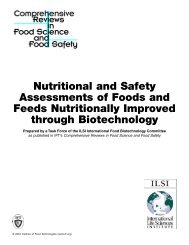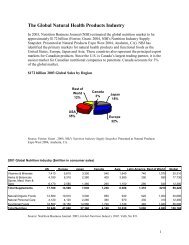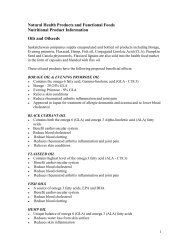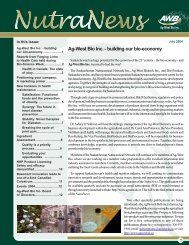Beyond Borders: Global biotechnology report 2010
Beyond Borders: Global biotechnology report 2010
Beyond Borders: Global biotechnology report 2010
Create successful ePaper yourself
Turn your PDF publications into a flip-book with our unique Google optimized e-Paper software.
Conversation on emerging markets<br />
New opportunities<br />
Kiran Mazumdar-Shaw<br />
Biocon<br />
CEO<br />
Canwen Jiang, MD, PhD<br />
Genzyme<br />
Vice President and<br />
Head of Genzyme R&D Asia<br />
26 <strong>Beyond</strong> borders <strong>Global</strong> <strong>biotechnology</strong> <strong>report</strong> <strong>2010</strong><br />
Emerging markets have attracted increasing attention from Western companies<br />
in recent years, driven by the brisk growth and tremendous potential in these<br />
markets, as well as the rapidly evolving strengths of new generations of companies<br />
in these locations. As we surveyed the “new normal” for this year’s <strong>Beyond</strong> borders,<br />
we wondered how changing market realities have affected these trends. Has the<br />
performance of companies in emerging markets been hurt by the global economic<br />
downturn? As biotech companies in the West adjust to the new normal and the need to<br />
find new sources of efficiency, what role are companies in emerging markets playing?<br />
To get some perspectives on these questions, we sat down in early <strong>2010</strong> with a couple of<br />
industry leaders from two emerging-market giants — India and China. Canwen Jiang,<br />
Vice President and Head of R&D for Genzyme R&D Asia, has been with the<br />
Massachusetts-based company since 1994 and currently heads Genzyme’s R&D<br />
operations and strategy in the Asia markets with a focus on China. Kiran Mazumdar-Shaw<br />
is the long-tenured CEO of Bangalore-based Biocon, a leading Indian biotech compan<br />
that provides services through its Syngene and Clinigene units while also developing<br />
novel biopharmaceuticals.<br />
The picture these two leaders paint is encouraging. Not only have emerging markets<br />
survived the downturn, but many firms in these locations have even benefited from<br />
their ability to provide the very efficiencies that Western firms are seeking. As<br />
companies in the West look for new approaches to sustainability, they will increasingly<br />
need to look at emerging markets in new ways.<br />
Ernst & Young: What impact did the global economic downturn have on the biotech<br />
industry in China and India? What’s the situation today? Is a “new normal” emerging<br />
after the dust has settled?<br />
Jiang: China’s experience has been quite different from what happened in the West. On<br />
one hand, the Government has started providing very significant funding for life-sciences<br />
start-ups. Policy-makers view this as a strategic long-term investment in building a<br />
knowledge-based economy. As a result, China remains an attractive location for companies,<br />
including Western companies which are moving to China to take advantage of the<br />
infrastructure that’s been built.<br />
On the other hand, China is part of the global economy and an important player in<br />
the globalization of drug R&D. So as Western companies — particularly early-stage<br />
companies — have faced financial difficulties, they have had to cut back on their<br />
spending in China, for instance with Chinese CROs.








